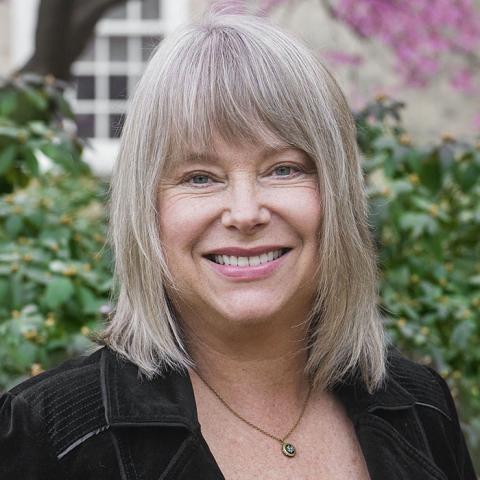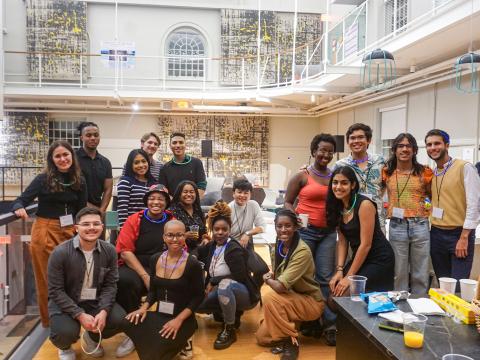Diversifying the Scholarly Ranks

Details
The Mellon Mays Undergraduate Fellowship program seeks to remedy the shortage of faculty of color in higher education. Since the College joined the national network two decades ago, 99 Haverford students have benefitted from the stipends, support, and crucial mentorship it provides.
Initially, when Nicholas R. Jones ’05 entered Haverford College, he had a vague notion he would go into business after graduation and use his fluency in Spanish to advance an international career. Israel Burshatin, his Spanish professor at Haverford who was actively involved in the Mellon Mays Undergraduate Fellowship (MMUF) program, changed his thinking.
Fast forward and Jones, one of Haverford’s early MMUF graduates, was an obvious choice to be the keynote speaker for November's Mid-Atlantic Regional MMUF Conference held at the College.
Now an assistant professor of Spanish and Portuguese at Yale University, Jones launched his career in academia via the MMUF program, which strives to diversify the pool of students pursuing Ph.D.s in the humanities and some social science disciplines and aid them on the path to becoming college and university professors in their fields.
Initiated by the Andrew W. Mellon Foundation to help remedy the serious shortage of faculty of color in higher education, the MMUF program is a national network of scholars from more than 90 of the top universities and colleges in the United States. Haverford ‘s MMUF Fellows meet regularly on campus as well as with Fellows in the regional consortium, which includes Cornell, Penn, Princeton, Bryn Mawr, and Swarthmore. Each school takes turns hosting an annual conference, in which students present papers and share their research for discussion. This year’s Mid-Atlantic Regional Conference, held at Haverford, was dedicated to Paul B. Moses ’51 (1929-66), one of the school’s first African American graduates, who became a professor at the University of Chicago. His life ended tragically at age 36 when he was killed during a robbery attempt.
Jones credits Burshatin with not only connecting him with MMUF, but says his professor’s mentorship was also key. ``He encouraged me to study and to pursue my own intellectual and scholarly personal interests,” says Jones. “He led by example through rigorous, quality scholarship, and critical thought. And on an interpersonal level, [he showed me] how to be the best colleague and person that someone can be. He stuck around for much of my academic journey. He was even on my dissertation committee at NYU. He was so instrumental.’’
During Jones’ conference address in November, he read excerpts from his second book, which is in progress. His first book,, Staging 'Habla de Negros': Radical Performances of the African Diaspora in Early Modern Spain, which garnered the Outstanding First Book Prize from the Association for the Study of the Worldwide African Diaspora.
"By the time I started college and then in grad school, I was kind of tired of always hearing people talk about Black people only coming from Latin America or on this side of the Atlantic,’’ he says. ``What I do now as an academic and professor is to really expose students, colleagues, and readers to different narratives about African-descended people. There are Black people in Europe, [and] everywhere all across the globe."
The College joined the nationwide MMUF program in 2000 and since then 99 Haverford students have benefitted from the stipends that support research and scholarly pursuits. Each fellow is awarded $4,000 during the academic year, alleviating or eliminating the need for additional paid employment. The MMUF program at Haverford offers an additional stipend of up to $4,500 to students who wish to continue their academic pursuits into the summer months.
"We do have some students who join the program saying they want to go to graduate school, they want to get Ph.D.s, they want to become professors,’’ says Haverford’s MMUF Faculty Coordinator Rajeswari Mohan. "And then there are other students who have the potential but who haven't really thought about what that involves. MMUF provides them the support and encouragement to develop into scholars ready for graduate school."
Ebony Graham ’23 entered Haverford with the idea of becoming a high school teacher, although the notion of post-secondary teaching had also crossed her mind. She says learning that her major didn’t accommodate a teaching certification provided incentive to “just go for a Ph.D.,” and around that same time, she adds, several students told her about Mellon Mays. “I applied and was accepted, which was amazing,” Graham says. Now, she is one of 11 Haverford students currently involved in the program. At the recent conference, Graham, an environmental studies major with Africana and education studies as minors, presented her research paper, ``Food is Power,’’ which examines the role of food in society, specifically how it is used to gain power.
"Whether it is commercial power, whether it's power shared in a community, whether it's food sovereignty,’’ she says. ``It's a way for us to come together and meet, have conversations—even difficult conversations."
Mohan, an associate professor and chair of the English Department, says she has seen the MMUF program overcome challenges as it has grown. The pandemic, for example, ``hit our Fellows very badly,’’ she says. ”A few of them ended up taking Dean’s leaves because of family circumstances, and it took the active intervention of program coordinators to get them back to campus and regular academic life where they are now doing fantastic work. Without the encouragement of [MMUF] mentors and cohorts, he may not have come back.’’
Says Dean Tensuan, "The Mellon Foundation is really concerned about diversifying the professoriate to break through structural racism. And in a beautiful way, that reflects Haverford’s own investments. Our MMUF program has a disproportionate number of first-generation students for whom Mellon is making this pathway visible and available.’’
—Sam Donellon








